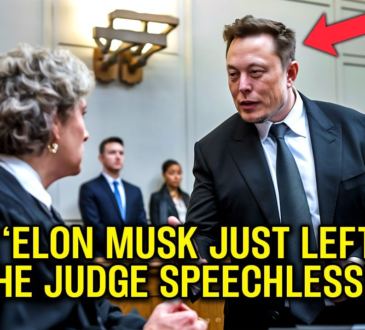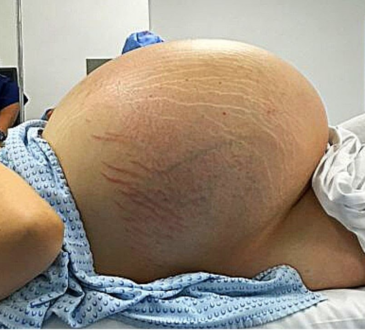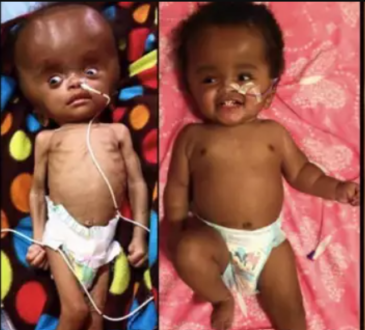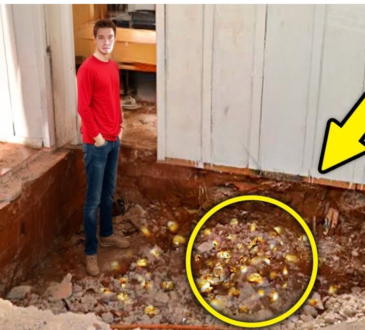Cop Can’t Revive Black Baby, Has No Idea Camera Records And Does Something Drastic We’ve Never Seen!
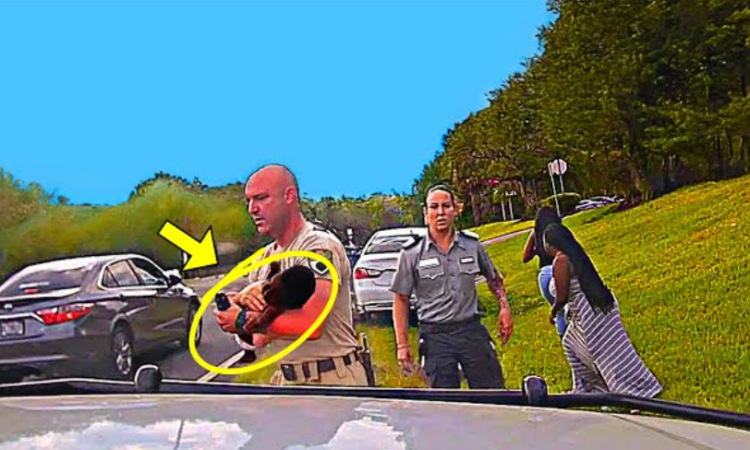
A life-threatening emergency plays out when a black infant stops breathing, and a cop desperately tries to revive the child. He has no idea his dash cam and body cam are recording everything. When the baby doesn’t respond to CPR, the policeman does something drastic no one had anticipated.
Deputy Jeremy Nicks was waiting at a red light in Ocala, Florida. His shift was over, and thoughts of home swirled in his mind. Suddenly, his attention was drawn to a white Hyundai sedan on the opposite side of the road. The car swerved and pulled over abruptly. A woman stumbled out of the passenger side and frantically waved one arm while clutching a small limp bundle in the other. Her desperate eyes locked onto Nicks’s squad car.
The cop’s training kicked in. He made a sharp U-turn with his siren blaring and pulled up behind the Hyundai. The woman rushed to his window, cradling her baby. “Please help! He’s not breathing,” she cried and thrust the tiny form into his arms. The baby’s name was Kingston, and he was completely unresponsive. Nicks laid him gently on the hood of his car. His hands were steady, but his heart was racing. He began administering CPR, his mind focused on the rhythm: compress, breathe, check. The mother was still on the phone with emergency dispatch and relayed his actions in a shaky voice.
Seconds ticked by. Nicks’s efforts showed no immediate results; Kingston remained motionless. The sense of urgency intensified. Nicks could feel the weight of the situation pressing down on him. He couldn’t fail this child. As he worked, the woman’s voice trembled, “Please hurry!” Nicks realized he needed to do something drastic. “Get Kingston to the hospital now,” he instructed the mother to move her car out of the way. Gently, he took Kingston into his squad car. The hospital was only a few miles away; every second counted. He buckled the baby in, started the engine, and sped off. His eyes flickered between the road and Kingston. In his mind, he repeated a silent prayer as he drove.
Nicks was unaware that the entire incident was being recorded by his dash camera. His singular focus was on saving Kingston’s life. His initial attempts had failed, but he wasn’t about to give up. He pushed the car harder. The hospital was in sight now. His only thought was to get there fast.
Deputy Nicks’s heart pounded as he sped toward Ocala Regional Medical Center. He glanced at Kingston; the infant was still unresponsive despite his efforts. Nicks felt a wave of helplessness but quickly pushed it aside. There was no time for doubt. The road to the hospital was typically a 10-minute drive, but today it felt like an eternity.
Nicks weaved through traffic with his lights flashing and the siren wailing. Other drivers hurriedly moved aside. As he approached a busy intersection, Nicks encountered a solid wall of traffic. Cars were at a standstill. Panic threatened to rise, but Nicks fought it down. He leaned on the horn, but the congestion barely budged. Frustration and fear gnawed at him. The hospital was so close yet so far.
With desperation mounting, Nicks considered his options. There was no way around the traffic jam. He needed a miracle. Just then, a flash of movement caught his eye. A motorcycle was weaving through the cars, heading straight for him. The rider was clad in black, and a helmet obscured their face. He pulled up alongside Nicks’s window and signaled him to follow.
Nicks hesitated for a split second. Trusting a stranger was risky, but he had no other choice. The rider seemed to understand the urgency of the situation. Nicks nodded, and the motorcyclist took off. He expertly navigated through the gridlock. Nicks followed closely, his focus now split between the mysterious guide and the precious cargo in his back seat.
The motorcyclist skillfully cleared a path. He waved at drivers to move aside and created just enough space for Nicks’s squad car to squeeze through. The stranger’s presence was like a beacon of hope in a sea of despair. As they approached another bottleneck, the motorcyclist signaled again. This time, he led Nicks down a narrow side street.
This route was unfamiliar, but the rider’s actions were deliberate and purposeful. The detour bypassed the worst of the traffic and brought them back to the main road with the hospital in sight. Relief washed over Nicks, but he knew the race wasn’t over yet. The motorcyclist led them to the hospital’s emergency entrance. Nicks barely had time to thank the mysterious rider. The hospital’s emergency room doors burst open as Nicks rushed in, cradling Kingston in his arms.
The medical team sprang into action and immediately took the baby from him. Nicks, worried and exhausted from the flood of adrenaline in his system, followed them as far as he could before being stopped by a nurse. “Sir, you need to wait here,” she said firmly and guided him to a bench in the corridor. Nicks nodded, unable to speak. His breath came in ragged gasps as he watched the team disappear into a treatment room. The doors swung shut behind them, leaving an eerie silence in their wake.
Nicks collapsed onto the bench, his body finally giving in to the emotional toll. He buried his face in his hands and replayed the events of the past hour in his mind: the frantic drive, the stranger on the motorcycle, the feeling of Kingston’s tiny lifeless body in his hands. Had he done enough? Had he acted quickly enough? Doubt gnawed at him. It quickly became a relentless and cruel companion.
Time seemed to stretch and warp. He stared at the clock on the wall and willed its hands to move faster. Then he prayed for some sign of hope. Every second felt like an eternity. The sterile hospital smells, the distant beeping of monitors, the muffled conversations—all of it blurred together as he sat waiting. Nicks’s thoughts spiraled. What if his efforts had been in vain? What if Kingston didn’t make it? The weight of responsibility pressed down on him. He had sworn to protect and serve, but today he felt utterly powerless. His hands, usually so steady, now trembled uncontrollably.
Just as he felt he might be overwhelmed by the torrent of his thoughts, his phone rang. He fumbled to answer it, his fingers clumsy with fatigue. “Deputy Nicks,” he answered. “It’s one of the doctors. I wanted to let you know that Kingston is showing signs of improvement. He is responding to treatment.” Relief flooded through Nicks. It was so powerful that it left him lightheaded. “Thank God,” he whispered, his voice thick with emotion. He thanked the doctor and hung up. For the first time since the ordeal began, he felt a glimmer of hope. He allowed himself a moment to breathe, to let the news sink in. Kingston had a fighting chance.
But the reprieve was short-lived. As he looked up, he saw Kingston’s mother approaching, her face a mask of anger and grief. She stormed towards him with blazing eyes. “You!” she shouted, her voice echoing down the corridor. “You did this! You hurt my baby!” Nicks stood up, taken aback. He opened his mouth to reply, but she cut him off. Her voice cracked with emotion. “I trusted you! You took him from me, and now look what’s happened!” Nicks’s heart sank.
He tried to explain that he was trying to help, that he did everything he could to get Kingston to the hospital as fast as possible. “You should have waited for the ambulance,” the mother cried. “You should have let the paramedics handle it. Now my baby’s fighting for his life because of you!” Her words hit Nicks like a physical blow. He opened his mouth to respond, but no words came. He had been so focused on saving Kingston, on doing what he thought was right, that he hadn’t considered how it might look from her perspective. The guilt that had been gnawing at him intensified.
The hospital staff intervened and gently guided the distraught mother away, trying to calm her down. Nicks watched her go, his heart heavy. He sank back onto the bench. The earlier hope was now overshadowed by doubt and regret. He had acted with the best intentions, but had he made the right decision? The question hung in the air, unanswered.
The mother’s words echoed in Nicks’s mind in a relentless chorus of doubt and guilt. He sat alone in the hospital corridor with his head in his hands. Every decision he had made was now under scrutiny, not just by others but by himself. He kept replaying the events in his mind: the frantic drive, the desperate attempts to revive Kingston, and the stranger on the motorcycle. He had acted on instinct, driven by the urgency of the situation. But now, sitting in the sterile hospital hallway, those actions seemed fraught with uncertainty. The mother’s accusations gnawed at him.
Nicks’s eyes were fixed on the door to the treatment room where Kingston was being cared for. Nurses and doctors moved in and out, their faces grave and their movements hurried. Nicks caught glimpses of their expressions, searching for any sign of hope but finding only the stark reality of a fight for survival. Kingston’s condition fluctuated. Each update from the medical staff created a roller coaster of emotion. One moment there was a glimmer of hope; the next brought a plunge into despair. Nicks felt every high and low as if it were his own child in there. The mother’s earlier rage still stung, and her absence now was a constant reminder of his perceived failure.
Nicks couldn’t shake the feeling
of responsibility. He had taken Kingston into his care. He had made the call to drive him to the hospital himself. If Kingston didn’t pull through, Nicks knew he would bear that burden for the rest of his life. The thought of it was almost too much. In the midst of his turmoil, a nurse approached him. “Deputy Nicks,” she said gently, “would you like to see the footage from your body cam? Sometimes seeing things from a different perspective can help.” Nicks hesitated. The idea of reliving those moments was daunting, but he needed to know if he had done the right thing. He needed to see for himself.
Nicks followed the nurse to a small office where a monitor was set up. The body cam footage was already loaded. It was paused at the moment he first encountered the distressed mother. Nicks took a deep breath and nodded for the nurse to start the playback. The screen flickered to life, and there it was: the frantic wave, the desperate handover of the baby, his own steady voice as he gave instructions.
Nicks watched himself work. His actions were methodical and calm despite the chaos. He saw his hands performing CPR, saw the unwavering focus in his eyes. As the footage played, he realized just how critical those moments had been. He watched as he made the decision to drive Kingston to the hospital and saw the urgency in his movements and his determination.
The drive itself was a blur of lights and sounds. The dash cam captured the harrowing journey. And then the stranger on the motorcycle appeared, cutting through the traffic like a guardian angel. The rider’s assistance had been invaluable. It had created a path where there had been none.
As the footage continued, Nicks’s perspective began to shift. He saw the fear and desperation in his own face, but he also noticed the unwavering resolve. He had done everything he could and taken every step to ensure Kingston had a fighting chance. His unconventional actions had been necessary, driven by the immediacy of the situation.
When the footage ended, Nicks felt a sense of clarity wash over him. He turned to the nurse, who had been watching silently. “You did everything right,” she said softly. “Without your quick thinking, Kingston might not have made it this far.” Nicks nodded, the weight of guilt lifting a little. He had acted in the moment with the best intentions and the skills he had. The footage was proof that he hadn’t failed. He had fought for Kingston’s life with everything he had.
Feeling a renewed sense of purpose, Nicks stood up. Kingston’s fight wasn’t over, and neither was his. He would have to face not only the consequences of his actions but also the judgment of those he had tried to help. It was a burden he would carry regardless of the outcome. Nicks knew he had to find Kingston’s mother. She needed to see the body cam footage. She needed to understand that every action he had taken was out of a desperate need to save her son’s life.
He found her in the waiting area, sitting alone, her face a mask of exhaustion and grief. “Ma’am,” Nicks began softly, approaching her with a cautious step. She looked up, her eyes red and swollen. “I want to show you something. Please, just give me a few minutes.”
She hesitated, her trust hesitant but then nodded. Nicks led her to the same small office where he had watched the footage. He motioned for her to sit down and started the video. As the scenes unfolded, Nicks watched her expression shift from anger to confusion, then to understanding. She saw his urgency, his dedication, and the critical moments where his actions had kept Kingston’s heart beating.
When the video ended, she sat in silence for a moment, processing everything she had seen. Nicks took a deep breath and broke the silence. “I’m so sorry for what you went through. I know it was terrifying. I just wanted to give Kingston the best chance.
Tears welled up in her eyes, but this time they were different. She looked at Nicks, her voice breaking when she spoke. “I was so scared. I thought I was losing him. Thank you for everything.” Nicks felt a wave of relief. They shared a quiet, heartfelt moment, and an understanding passed between them. She reached out and took his hand. She squeezed it tightly and said, “You saved my baby. I can never thank you enough.”
Just then, a nurse knocked on the door and peeked in. She had a broad smile on her face. “I have some good news,” she said, her voice bright with excitement. “Kingston has made a full recovery. He’s awake and doing well.” The mother’s face lit up with joy. Nicks felt a surge of relief wash over him. The nurse continued, “There’s someone else you should meet.” She led them back to the emergency room where Kingston lay in a crib. His tiny hands were moving, and his eyes were open and alert. Standing next to the crib was the mysterious motorcyclist, now without his helmet. He was a tall man with kind eyes and a warm smile.
“I’m Dr. Evan Carter,” he introduced himself. He shook Nicks’s hand and said, “I’m a pediatric surgeon here. I was on my way to the hospital when I saw you. I knew I had to help, and it’s a good thing I did. Kingston needed immediate care, and your quick thinking made all the difference.” The room was filled with an overwhelming sense of gratitude and relief. Kingston was safe, and it was all thanks to the combined efforts of these brave individuals. The mother hugged Nicks tightly. At last, he felt a sense of closure and peace. They had all fought for Kingston, and now they could finally breathe.
The news of Kingston’s miraculous recovery and the heroic actions of Deputy Nicks spread quickly. The local media picked up the story. Soon, Nicks found himself at the center of attention. The community rallied around him and celebrated his bravery and quick thinking. A small ceremony was held at the hospital where Nicks was honored for his actions. The sheriff himself presented him with a commendation, highlighting his dedication and courage. The mother held Kingston in her arms and stood beside him. Her gratitude was evident to all who watched.
As Nicks received his recognition, he felt a deep sense of fulfillment. He hadn’t sought out to be a hero; he had simply done what needed to be done. But seeing Kingston healthy and safe, and feeling the community’s support, made all the trials and doubts worthwhile. The mother spoke to the crowd, her voice wobbling a little with the emotion of the moment.
Deputy Nicks saved my baby’s life. In a moment of absolute terror, he was our rock. I can never thank him enough for what he did.” The crowd erupted in applause. Nicks felt warmth spread through him. The events of that day had been a whirlwind of fear and hope, but standing here now, surrounded by a supportive community, he felt a profound sense of connection and purpose.
The days following Kingston’s recovery were a whirlwind for Deputy Nicks. The story of his heroic actions spread like wildfire. It captured the attention of local and national news outlets. Headlines blared the dramatic tale: “Cop Can’t Revive Black Baby, Has No Idea Camera Records, and Does Something Drastic We’ve Never Seen.” The phrase became the anchor of the narrative and drew readers and viewers into the heart-pounding story.
The footage from Nicks’s dash cam and body cam played repeatedly on television screens and online platforms. The raw, unfiltered moments captured the urgency and determination in Nicks’s actions. Viewers saw the frantic mother waving him down, the intense CPR attempts, and the desperate drive through traffic. The climax of the footage showed the mysterious motorcyclist leading the way, adding an almost cinematic quality to the real-life drama.
Nicks found himself in the spotlight, interviewed by reporters who wanted to know every detail of the incident. He spoke humbly, always emphasizing the teamwork and the fortunate timing of Dr. Carter’s appearance. “I just did what I had to do,” he told one reporter. “At that moment, all I could think about was getting Kingston to the hospital as fast as possible.”
The coverage didn’t just focus on the dramatic rescue. It also highlighted the emotional journey: the mother’s initial anger and subsequent gratitude added depth to the story. It showed the raw human emotions involved. One particular news segment stood out. It featured an in-depth analysis of the dash cam footage, narrated by a veteran journalist.
Deputy Jeremy Nicks faced a situation that would have paralyzed many with fear,” the journalist began. “But his quick thinking and willingness to take drastic action saved a young life.” The segment cut to an interview with Dr. Evan Carter, the motorcyclist and pediatric surgeon who had helped clear the path. “Deputy Nicks’s decision to drive Kingston to the hospital himself was crucial,” Dr. Carter explained. “Every second counted, and his actions ensured that Kingston received the care he needed just in time.”
Nicks watched these reports with both pride and humility. He had never sought the spotlight, but he was grateful that Kingston’s story was being shared. It was a powerful reminder of the impact that one person’s actions could have on the lives of others. The media coverage brought attention to the importance of quick thinking in emergencies, and Nicks hoped it would inspire others to act decisively in critical moments.
The culmination of the coverage was a special segment on a national morning show. Nicks, Kingston, and his mother were invited to appear. Nicks held Kingston, who was now lively and smiling. The mother recounted her initial fear and eventual gratitude, and Nicks spoke about the support he’d received. “It’s been overwhelming,” he admitted, “but seeing Kingston healthy and happy makes it all worth it.” The segment ended on a heartwarming note. The host looked directly into the
camera and addressed the viewers, “Deputy Nicks’s story is a powerful reminder that in moments of crisis, extraordinary actions can lead to miraculous outcomes. We salute his bravery and the resilience of this incredible family.” As the camera panned out, it captured the trio in a warm embrace. The ordeal had brought out the best in everyone involved, and now Kingston’s story would continue to inspire and uplift countless others. It was a testament to the power of courage, quick thinking, and the willingness to do something drastic when it mattered most.

